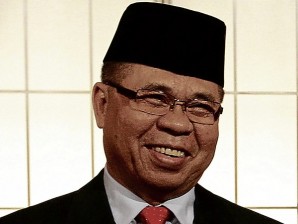MANILA, Philippines — About 200 Muslim rebels led by their elusive chief arrived in the Philippine capital on Sunday for the signing of a preliminary peace pact aimed at ending one of Asia’s longest-running insurgencies.
The Moro Islamic Liberation Front’s decades-long rebellion has killed tens of thousands of people and held back progress in the south, where Muslims make up a sizable minority. Government and rebel negotiators forged the framework peace agreement Oct. 7 in Malaysia after 15 years of tough negotiations.
The pact’s signing on Monday will be witnessed by President Benigno Aquino III, Malaysian Prime Minister Najib Razak and rebel chairman Al Haj Murad Ebrahim, who will set foot for the first time in Manila’s Malacanang presidential palace, where officials have prepared a red-carpet welcome.
The bespectacled Murad has seldom appeared in public in past years. Aquino met Murad secretly in Tokyo in their first meeting last year to underscore their commitment to settle the long-festering rebellion.
About 300 Muslims from Manila and southern provinces held a noisy rally outside the palace on Sunday in support of the preliminary accord, yelling “Allahu Akbar,” or “God is great.” They called for more development in resource-rich but impoverished southern Mindanao region, homeland of minority Muslims in the predominantly Roman Catholic nation.
Security has been tightened in the capital, although no disruptions were expected.
The agreement is to be signed by government negotiator Marvic Leonen and his rebel counterpart, Mohagher Iqbal, and it will serve as a roadmap that outlines general agreements on major issues, including the extent of power, revenues and territory of a new Muslim autonomous region to be called Bangsamoro.
Both sides are to negotiate details to arrive at a final peace deal by 2016, when Aquino’s six-year term ends, officials said.
The accord also calls for the establishment of a 15-member Transition Commission that would draft a law creating a new Muslim-administered region. Rebel forces would be deactivated gradually “beyond use,” the agreement says, without specifying a timetable.
The deal marks the most significant progress in years of tough bargaining with the 11,000-strong Moro group to end an uprising that has left more than 120,000 people dead and displaced about 2 million others. Western governments have long been worried over the presence of small numbers of al-Qaida-linked militants from the Middle East and Southeast Asia seeking combat training and collaboration with the Filipino insurgents.
The new Muslim region would be built upon an existing five-province autonomous territory, among the country’s poorest and most violent. The Moro rebels earlier dropped a demand for a separate Muslim state and renounced terrorism.
Iqbal earlier said his group would not lay down its weapons until a final peace accord is concluded. He said the insurgents could form a political party and run in democratic elections to get a chance at leading the autonomous region.
In 2008, a planned signing of a similar preliminary pact was scuttled when opponents went to the Supreme Court, which declared the agreement unconstitutional. New fighting erupted when three rebel commanders attacked Christian communities, leaving more than 100 people dead and about 750,000 villagers displaced before a cease-fire ended the violence.
One of the hard-line rebel commanders, Ameril Umbra Kato, broke off from the main Moro insurgents last year. Kato’s forces launched attacks on several army camps and outposts in August, prompting another army offensive that killed more than 50 fighters in the 200-strong rebel faction.
Abu Misri Mammah, a spokesman for Kato’s forces, said on Sunday that his group does not recognize the accord between the government and the main Moro insurgents.
“That’s a surrender,” he said. “We won’t waver from our armed struggle and continue to aspire for a separate Muslim homeland that won’t be a creation of politicians.”


